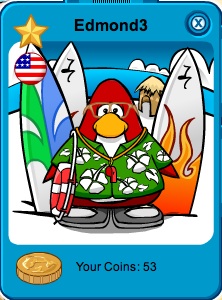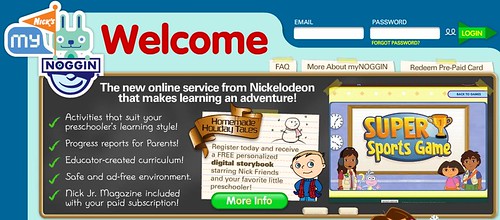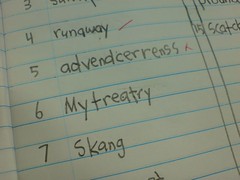Like a large number of North American households with Internet access and elementary age children this holiday season, our home was the scene of many hours logged on both Club Penguin and Webkinz the past couple weeks.
After Christmas, we made a momentous purchase for our five year old: A new Webkinz Penguin she’s named “Sparkle,” which has provided her with the virtual keys to experience the online world of Webkinz along with her older brother and sister. It is amazing to watch our kids teach each other different things about these virtual worlds. They are acquiring more than motor skills: There is a LOT of reading and problem solving going on, not to mention personal finance management as they decide how to use or save the virtual fortunes they are amassing in these online worlds.
My son explained to me yesterday why he would never consider running Webkinz as a separate webapp with a program like Prism— he always has other webpages open (as tabs) when he’s playing Webkinz, where he gets tips and tricks for what to buy in the store, what to play, etc. When I asked him how he found those websites to use, the tone of his answer when he said “Google” communicated something like, “Geez Dad, what planet do you live on?”
This evening we had an important teachable moment involving Webkinz, which highlights multiple things– including the importance of parents having regular discussions with children about what they are doing online. While my 11 year old son was away from his laptop, but still logged into Webkinz, my 8 year old daughter used his account and sent herself a 50% discount coupon for the Webkinz store from his account. She hadn’t obtained permission to do this, and she knew it was wrong. This led to several discussions tonight, apologies, and a consequence that she can’t use the computer at home for the next two days.
Things that happen in the virtual, online world DO matter just as things we do in the real, face-to-face world matter. Perceptions shape reality. I explained to my daughter that her act of going into her brother’s Webkinz account and sending herself that coupon without permission was just like him going into her room and eating a box of chocolates that she received for Christmas, without permission. It was stealing, taking something that did not belong to her without permission, and it was wrong.
Sarah was testing the boundaries of what she could do online and get away with, and testing boundaries is a very natural thing for kids to do. Overall I think our discussions about this were very constructive. She actually wrote my son a note and tried to give him a large part of her Christmas money that she’d received as compensation for this “Webkinz wrong,” so this situation provided a good opportunity to also discuss forgiveness and grace. Lots of good discussions about ethics.
During 2006-2008 when I worked for AT&T as a state education advocate and presented frequently on the topics of Internet safety and safe digital social networking, I was often amazed how conversations with students about Webkinz could tie directly into important lessons about password security and digital citizenship. In a large group of elementary students, typically there would be at least one student who had lost control of his/her Webkinz password and had all their Webkinz possessions sold as a result by a malicious Webkinz account thief. When I invited students to share their stories about Webkinz thefts, it was amazing to see how RIVETED other students were in listening to these tales. These were not “pretend” or “just virtual” experiences that had happened to the child’s Webkinz account: These were REAL experiences that were VERY traumatic and led to some important lessons learned.
When I was growing up, I didn’t have opportunities to interact with others and amass virtual possessions in online worlds like Club Penguin or Webkinz. While kids as well as adults can certainly waste a lot of time online playing games as well as consuming media in various forms, I think there is much more comparative value to my children participating in interactive, online environments like these rather than simply watching television passively. The advent of more streaming video shared on websites means passive TV watching CAN and does happen frequently when kids are online, but I’d say they spend at least 90% of their time online interactively DOING things rather than just “watching.”
I saw tonight that Nick Jr has launched a new commercial enterprise, MyNoggin, which is subscription-based and encourages kids to remain active/engaged on the website by earning virtual marbles and exchanging them for furniture and toys to put in their own virtual rooms. Sounds a lot like Webkinz and Club Penguin. It doesn’t take a rocket scientist to see the pattern and recipe here.
It’s amazing to compare the level of self-directed learning and engaging online learning opportunities available to my children here in our home, to the traditional, textbook and worksheet-based classroom learning experiences to which they’ll return tomorrow at school. Strange ironies of our 21st century existence.
Home:
– Everyone has a laptop they can use
– Everyone has access to filtered but very open high speed WiFi Internet access
– Everyone has access to an iPod, iPod Touch or my iPhone to watch movies, play games, or access other web applications
School:
– No one has a laptop (even the teachers don’t)
– No WiFi Internet is available for anyone to use
– iPods and iPhones are banned
My son was shaking his head tonight as he said several times, “I can’t believe tomorrow is school.” Yep. Back to school. Get out that paper and pencil. It’s going to be time for another spelling test.
Technorati Tags:
webkinz, clubpenguin, ethics, school, home, internet, learning
If you enjoyed this post and found it useful, subscribe to Wes’ free newsletter. Check out Wes’ video tutorial library, “Playing with Media.” Information about more ways to learn with Dr. Wesley Fryer are available on wesfryer.com/after.
On this day..
- Guidelines for Digital Sharing – 2019
- Craigslist and Facebook Bring Lost Golden Retriever Home – 2014
- Create a Personal Publication Archive with Open Journal Systems (OJS) – 2014
- Teaching is a moral calling (Will someone please tell Arne and Barack?) – 2011
- iPad Fever and 1 to 1 Learning Lessons from the Experts – 2011
- Favorite Picture Books About Maine – 2011
- Enabling YouTube Comment Moderation (Screenr Screencast Tutorial) – 2010
- A blast back to my podcasting past – 2008
- Want E-learning job leads? Get Linked-In! – 2008
- Broadband Bootcamp for Educators – 2008





Comments
5 responses to “A holiday lesson in ethics via Webkinz”
What a great lesson for your kids. I am so sorry that they are not getting the advantages to their education that they should at school, but at least at home they are getting it. They are lucky to have you & your wife as parents.
With such a wired household, can you tell me about how you moderate screen time? We are having challenges with our 13 & 14 yr old boys who want to spend all weekend on the new xbox, the wii, the internet. We moved to a recreation-rich area in hopes that they would spend more time outdoors and are struggling with the incessant desire to play video games(and argue about them). Thoughts? Advice? (Of course, as parents, we are online all the time as well, but still manage to fish, walk, bike, a little tennis.)
What with Science Fair coming up and semester exams starting next week, we ended up with homework almost every day during “break”.
Our home is not as wired as the Fryer home: we have wireless, but it only covers one room (the book/computer room, which is currently unheated due to a gas pipe rusting through in just a few years). We have no iPod, iPhone, cell phone, TV, …, so the desktop computer in the book room is our main electronic entertainment center. We all use it for internet access, and we occasionally watch a DVD on it together (we got a collection of Mythbuster episodes this Christmas).
Under these circumstances, controlling excessive computer usage is fairly easy.
Cassyt:
Moderating screen time has become a big issue not only for our kids but also for me. At some points this has been an issue for my wife with TV. We don’t have the answers on this but these are some things we’ve done and are doing.
Sometimes we have declared a “no screen time.” This can be for an evening or an afternoon. That means no TV, computers, iPods, or game systems. We do at times, when the weather is reasonable, send all the kids outside to play with friends, ride bikes, etc. I have no doubt that there are addictive elements to screens which make them very challenging. Walks around our neighborhood, family bike rides, and trips or picnics to the park are also good in this regard. We need to do all those things more.
We did try, for awhile, using the time limits built into Mac OS X, giving my son two hours of computer time for example. When he got his own older laptop, however, that didn’t work because the parental control features aren’t in his older operating system. I discussed these issues a bit with my brother in law in “Podcast213: Comparing Parental Control Options in Windows Vista and Mac OS 10.5 Leopard.” You might also look at my post “Home Internet Content filtering needs: Solved with OpenDNS.”. I am really sold on OpenDNS for home content filtering, and it is free.
Basically, as I’ve discussed in other contexts, I don’t think there is a technological “solution” to the issue of limiting screen time. I think it is valuable for all of us to have times of “no screens.” Dr. Richard Swenson’s book “Margin: Restoring Emotional, Physical, Financial, and Time Reserves to Overloaded Lives” was one of the first books I read which suggests this for families. He talks about it in the context of “pretending it is 1870,” in terms of the technologies which are permissible for those family evenings. We don’t take it that far and stop using electricity, but it is worth considering I suppose at times. The point is to DISCONNECT and both remember and experience the value of interacting with others sans digital technologies. Thoughts along these lines are certainly one of the reasons our family loves camping. (Which for us does not involve an RV with electricity, just an old pop-up trailer.)
A search on my blog for swenson and margin will turn up some other posts from the past about these issues.
Like other parenting issues, I’m sure this is a case where “1 size does not fit all.” I do think it’s important we not only discuss these issues, but also practice discipline in not allowing our screens to rule our lives. Living with intentionality is really important, and this is a big part of “digital discipline,” which is a topic I hope to write much more on in the future.
What about others? How are you dealing with screen time limits at home?
I would like to comment on the last statement you made about how different learning experiences are at home and at school these days! I could not agree with you more! I am a third grade teacher in GA and as part of a master’s class on technology in the classroom we have been discussing this very issue. Classrooms and children are different today compared to even when I was growing up and I’m only 28. The classroom needs to be filled with the technology that runs our world so that we can prepare our students for their future no matter what field they may eventually work in. Thanks for the insight!